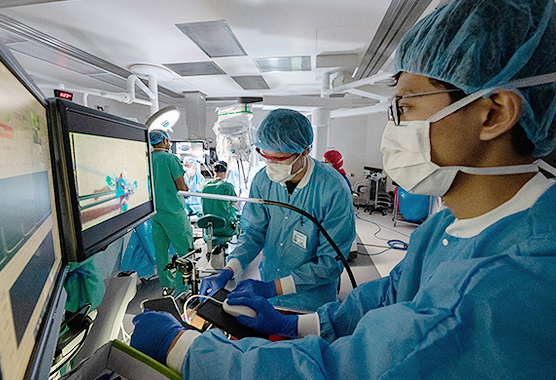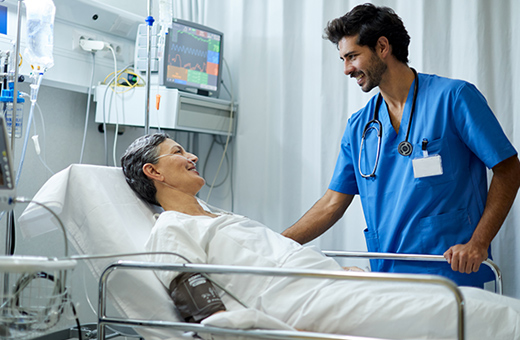Endocrine Surgery
We use innovative, minimally invasive procedures for the quickest recovery and best cosmetic result. Our collaborative approach and leading-edge research let us bring the most advanced treatments to your care.
Medically reviewed by Michael Campbell, M.D. on Dec. 04, 2023.

Compassionate Care and Advanced Treatments
At UC Davis Section of Endocrine Surgery, we understand how endocrine disorders can disrupt your life. We’re here to help. Our goal is to improve your life through leading-edge treatments.
We collaborate with specialists across the entire UC Davis Health system and conduct research on endocrine disorders. This allows us to provide the most comprehensive and advanced care.
Procedures
We use the most advanced procedures that minimize scarring and give you the speediest recovery. Our surgeons have special training in new techniques such as transoral surgery, where the incision is inside your lip and leaves no visible scar. We also perform radiofrequency ablation (RFA) of thyroid nodules, which is done without an incision.
Advanced Diagnostic Methods
We use the latest diagnostic methods to evaluate adrenal tumors, assess genetic endocrine conditions, and characterize thyroid nodules.
Laparoscopic and Robotic Adrenal Surgery
Adrenal tumors usually require removal of your entire adrenal gland. Using laparoscopic and robotic techniques, our specialists can perform this using four small incisions.
Minimally Invasive Parathyroidectomy or Thyroidectomy
Most thyroid and parathyroid procedures we perform use minimally invasive methods that leave a minor scar.
Thyroid Nodule and Goiter Management
We perform needle biopsy to check for cancer in thyroid nodules and goiters (enlarged thyroid). We can do minimally invasive surgery to remove cancerous or bothersome thyroid nodules.
Request an Appointment
As Sacramento's No. 1 hospital, you'll benefit from unique advantages in primary care and specialty care. This includes prevention, diagnosis and treatment options from experts in 150 specialties.
Referring Physicians
To refer a patient, submit an electronic referral form or call.
800-4-UCDAVIS
Patients
Call to make an appointment.
Consumer Resource Center
800-2-UCDAVIS
Your surgeon will explain your options, take time to answer all of your questions and create a personalized treatment plan. Our team will coordinate all steps before, during and after your surgery.
-

Before Surgery
Learn what to expect the day of surgeryarrow_forwardYour care team will tell you when to stop eating and drinking in preparation for your surgery. You may need scans or blood tests the day of your procedure.
-

After Surgery
Understand what to expect after surgeryarrow_forwardAfter your surgery, your team will monitor you in a recovery area while the anesthesia wears off. You may need to stay in the hospital overnight. Your care team will let you know how long to take off work and give you other instructions for your recovery.
Home Care After Endocrine Surgery
You may need several days or a few weeks to recover, depending on the type of procedure you have. Your care team will schedule your follow up appointment and give you specific instructions to follow during your recovery.
Incision Care
You can shower after surgery, but do not take a bath or submerge your incision for 2 weeks after your procedure. Protect your incision from sunlight by covering it or using sunscreen for at least 6 months.
Pain Medications
For thyroid and parathyroid surgery, most patients can take acetaminophen (Tylenol®) or ibuprofen (Advil®) for pain. For adrenal surgery, you may need narcotic pain medications. Follow instructions for taking all drugs.
Time Off
You may need 1 to 2 weeks off work to recover from surgery. It may take 2 to 4 weeks before you feel good enough to resume all of your normal activities.
When to Contact Your Surgeon
Call your surgeon if you experience fever, redness or swelling around your incision, numbness or tingling in your fingers or around your lips, problems urinating, excessive pain or excessive bloating.

Ranked among the nation’s best hospitals
A U.S. News & World Report best hospital in cardiology, heart & vascular surgery, diabetes & endocrinology, ENT, geriatrics, neurology & neurosurgery, and pulmonology & lung surgery.

Ranked among the nation’s best children’s hospitals
U.S. News & World Report ranked UC Davis Children’s Hospital among the best in pediatric nephrology, orthopedics*, and pulmonology & lung surgery. (*Together with Shriners Children’s Northern California)

Ranked Sacramento’s #1 hospital
Ranked Sacramento’s #1 hospital by U.S. News, and high-performing in aortic valve surgery, back surgery (spinal fusion), COPD, colon cancer surgery, diabetes, gynecological cancer surgery, heart arrhythmia, heart failure, kidney failure, leukemia, lymphoma & myeloma, lung cancer surgery, pacemaker implantation, pneumonia, prostate cancer surgery, stroke, TAVR, cancer, orthopedics, gastroenterology & GI surgery, and urology.

The nation’s highest nursing honor
UC Davis Medical Center has received Magnet® recognition, the nation’s highest honor for nursing excellence.

World-class cancer care
One of ~59 U.S. cancer centers designated “comprehensive” by the National Cancer Institute.

A leader in health care equality
For the 13th consecutive year, UC Davis Medical Center has been recognized as an LGBTQ+ Healthcare Equality Leader by the educational arm of America’s largest civil rights organization.
